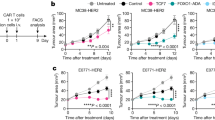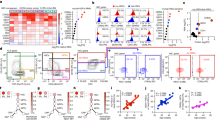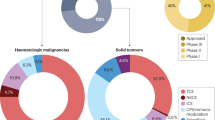Abstract
Campath-1G is a CD52 (rat IgG2b) moAb used in bone marrow transplantation (BMT) to prevent graft-versus-host disease (GVHD) by the elimination of T cells via antibody-dependent cell cytotoxicity (ADCC) in vivo. We have previously reported that Campath-1G induces T cell proliferation, activation, and production of cytokines which in turn causes an enhancement of megakaryocytopoiesis in vitro. In view of the fact that recent studies have indicated that natural killer (NK) cells may also be involved in the regulation of megakaryocytopoiesis, we undertook the study of the in vitro effect of Campath-1G-treated NK cells on the regulation of megakaryocytopoiesis. Early burst-forming BFU-MK and late colony-forming CFU-MK were grown from 2 × 105 peripheral blood non-adherent mononuclear cells (NAMC) in plasma clots in the presence of aplastic canine plasma (PICS-J) which was used as megakaryocyte colony-stimulating factor (MK-CSF). The first step in elucidating this series of events was to investigate the direct influence of NK cells on megakaryocytopoiesis. Co-culturing NK cells (>85% CD16+) with autologous NAMC at a ratio of 1:1 resulted in a significant increase in the proliferation of CFU-MK and BFU-MK over NAMC cultured alone. This effect was further enhanced upon exposure of NK to Campath-1G (0.1–3 μ g/ml). To investigate the possible influence of soluble factors released from NK cells treated with Campath-1G on MK maturation, conditioned medium (CM) derived from Campath-1G-treated-enriched populations of NK cells was found to enhance MK progenitor growth. Our data demonstrate that resting and Campath-1G-treated NK may be involved in the immunomodulation of megakaryocytopoiesis.
This is a preview of subscription content, access via your institution
Access options
Subscribe to this journal
Receive 12 print issues and online access
$259.00 per year
only $21.58 per issue
Buy this article
- Purchase on Springer Link
- Instant access to full article PDF
Prices may be subject to local taxes which are calculated during checkout
Similar content being viewed by others
Author information
Authors and Affiliations
Rights and permissions
About this article
Cite this article
Nagler, A., Condiotti, R., Lubina, A. et al. Enhancement of megakaryocytopoiesis by Campath-1G-treated natural killer cells. Bone Marrow Transplant 20, 525–531 (1997). https://doi.org/10.1038/sj.bmt.1700952
Received:
Accepted:
Issue Date:
DOI: https://doi.org/10.1038/sj.bmt.1700952
Keywords
This article is cited by
-
Reduced platelet transfusions and earlier platelet engraftment using alemtuzumab-based conditioning regimen in allogeneic stem cell transplantation
Journal of Cancer Research and Clinical Oncology (2016)
-
Effect of anti-CD52 antibody alemtuzumab on ex-vivo culture of umbilical cord blood stem cells
Journal of Hematology & Oncology (2008)
-
Megakaryocyte colony-forming unit growth is enhanced by alemtuzumab: in vitro experiments and a case report of acquired amegakaryocytic thrombocytopenic purpura
Leukemia (2006)



